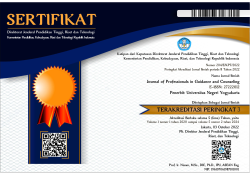The effect of permissive parenting style and peer pressure on disruptive behavior: An explanatory study
Downloads
This research aims to examine the influence of permissive parenting style and peer pressure on disruptive behavior of students at Muhammadiyah 2 Yogyakarta junior high school The research method used is a quantitative-correlational method with a prediction design. The population of this research is 498 students who were registered as 7th and 8th graders in the 2021/2022 academic year. The research subjects consist of 74 students, selected using purposive sampling technique, with the criteria that they perceive their parents as permissive and have been identified to have a tendency towards disruptive behavior. The measuring instruments used consist of the disruptive behavior scale, the permissive parenting style scale, and the peer pressure scale. The analysis technique used is multiple regression. The findings of this study indicate that there is a significant simultaneous effect of permissive parenting style and peer pressure on disruptive behavior. The effective contribution produced is 42%. Permissive parenting style partially does not have an influence on disruptive behavior, while peer pressure significantly affects the occurrence of disruptive behavior. The school is recommended to increase its awareness of peer pressure that triggers disruptive behavior in students. Parents are expected to adjust their parenting style to minimize the growth of disruptive behavior in children.
Downloads
American Psychiatric Association. (2013). Diagnostic and statistical manual of mental disorders, 5th edition_ DSM-5. American Psychiatric Publishing.
Arifin, Z. (2020). Teori perkembangan sosial anak dan pengaruhnya bagi pendidikan. TADARUS, 9(1). https://doi.org/10.30651/td.v9i1.5464.
Asizah. (2010). Children disruptive behavior well-being: pentingnya hubungan anak dan orangtua. Seminar Psikologi & Kemanusiaan. Psychology Forum UMM, from https://mpsi.umm.ac.id/files/file/46-54%20Asizah.pdf.
Aslan, A. (2019). Peran pola asuh orangtua di era digital. Jurnal Studia Insania, 7(1), 20. https://doi.org/10.18592/jsi.v7i1.2269.
Baumrind, D. (1966). Effects of authoritative parental control on child behavior. Wiley, 37.
Calvete, E., Orue, I., Gámez-Guadix, M., Hoyo-Bilbao, J. del, & de Arroyabe, E. L. (2015). Child-to-parent violence: an exploratory study of the roles of family violence and parental discipline through the stories told by spanish children and their parents. Violence and Victims, 30(6), 935–947. https://doi.org/10.1891/0886-6708.VV-D-14-00105.
Creswell, J. W. (2012). Planning, conducting, and evaluating quantitative and qualitative research (fourth edition). Boston: Pearson Education Inc.
Durham, N. H. (2012). Controlling parents more likely to have delinquent children, UNH Research Shows. Targeted News Service; Washington, D.C. https://search.proquest.com/docview/920964734?accountid=31324.
Gresham, F. M. (2015). Disruptive behavior disorders_ evidence-based practice for assessment and intervention. The Guilford Press. WWW.guilford.com.
Herbert, M., & Wookey, J. (2004). Managing children's disruptive behaviour: a guide for practitioners working with parents and foster parents. John Wiley & Sons. https://onlinelibrary.wiley.com/doi/10.1111/j.1475-3588.2005.00370_2.x.
Kayanti, D. D., Noviandri, L., Yustitiya, N., & Wulandari, D. (2020). Hubungan pola asuh permissive negligent ibu terhadap kecendrungan kenakalan remaja di SMAN X. INQUIRY: Jurnal Ilmiah Psikologi, 11(2), 115-132. https://journal.paramadina.ac.id/index.php/inquiry/article/view/455/206.
Marais, P., & Meier, C. (2010). Disruptive behaviour in the foundation phase of schooling. South African Journal of Education, 30(1), 41–57. https://doi.org/10.15700/saje.v30n1a315.
Miller, S., Loeber, R., & Hipwell, A. E. (2008). Peer deviance, parenting and disruptive behavior among young girls. Springer Science+Business Media, LCC. https://doi.org/10.1007/s10802-008-9265-1.
Muthmainnah, M., & Pujiharti, I. (2020). Faktor-faktor yang mempengaruhi perilaku disruptif remaja di SMAN 106 Jakarta. Afiat, 6(1), 49-59. https://uia.e-journal.id/afiat/article/view/2522.
Ormrod, J. E. (2008). Psikologi pendidikan. Membantu siswa tumbuh dan berkembang (edisi keenam). Penerbit Erlangga.
Pandri, D. P., & Netrawati, N. (2022). The importance of parents' attention to complete aggressive behavior. Jurnal EDUCATIO: Jurnal Pendidikan Indonesia, 8(1), 45. https://doi.org/10.29210/1202221492.
Papalia, D. E., Olds, S. W., & Feldman, R. D. (2009). Human development (11th ed). New York: NY: McGraw-Hill.
Purwaningtyas, F. D. (2020). Pengasuhan permissive orang tua dan kenakalan pada remaja. Jurnal Penelitian Psikologi, 11(1), 1–7. https://doi.org/10.29080/jpp.v11i1.337.
Quay, H. C., & Hogan, A. E. (Eds.). (1999). Handbook of disruptive behavior disorders. Springer US. https://doi.org/10.1007/978-1-4615-4881-2.
Santrock, J. W. (2014). Adolescence (fifteenth edition). New York, NY: McGraw-Hill Education.
Seeman, H. (2010). Preventing disruptive behavior in colleges: A campus and classroom management handbook for higher education. United Kingdom: Rowman & Littlefield Education.
Shehzadi, F., Bajwa, R. S., Batool, I., & Shah, A. A. (2018). Effects of perceived parenting styles on disruptive behavior among adolescents. Peshawar Journal of Psychology and Behavioral Sciences (PJPBS), 4(1), 1–13. https://doi.org/10.32879/picp.2018.4.2.1.
Syakarofath, N. A., & Subandi, S. (2019). Faktor ayah dan ibu yang berkontribusi terhadap munculnya gejala perilaku disruptif remaja. Jurnal Psikologi, 18(2), 230. https://doi.org/10.14710/jp.18.2.230-244.
Tarshis, T. P. (2010). Living with peer pressure and bullying. New York, NY: Facts on File, Inc. An imprint of Infibase Publishing.
Tolan, P. H., & Leventhal, B. L. (Eds.). (2013). Disruptive behavior disorders. Springer New York. https://doi.org/10.1007/978-1-4614-7557-6.
Tu, K. M., Elmore-Staton, L., Buckhalt, J. A., & El-Sheikh, M. (2018). The link between maternal sleep and permissive parenting style during late adolescence. Journal of Sleep Research, 27(5), e12676. https://doi.org/10.1111/jsr.12676.
Widiastuti, N., & Elshap, D. S. (2015). Pola asuh orang tua sebagai upaya menumbuhkan sikap tanggungjawab pada anak dalam menggunakan teknologi komunikasi. Jurnal Ilmiah UPT P2M STKIP Siliwangi, 2(2). https://doi.org/10.22460/p2m.v2i2p148-159.174.
Wittenborn, M. (2002). The relations between parenting styles and juvenile delinquency. 23. Honors Theses. Paper 266. https://opensiuc.lib.siu.edu/cgi/viewcontent.cgi?referer=&httpsredir=1&article=1263&context=uhp_theses.
 | ProGCouns: Professional Guidance and Counseling Journal is licensed under a Creative Commons Attribution-ShareAlike 4.0 International License. |















